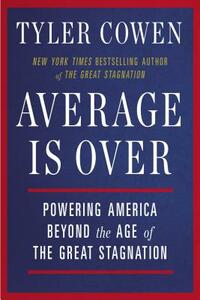Take a photo of a barcode or cover
28 reviews for:
Average Is Over: Powering America Beyond the Age of the Great Stagnation
Tyler Cowen
28 reviews for:
Average Is Over: Powering America Beyond the Age of the Great Stagnation
Tyler Cowen
It's amazing how well researched this book is. Many of the things 'predicted' has already come true. We are seeing the similar trends across the world as the author has pointed out.
This book's content may be a little too late now to be read for insights but it made me realise importance of contemporary non fiction titles.
A must read indeed. It's not too late still.
This book's content may be a little too late now to be read for insights but it made me realise importance of contemporary non fiction titles.
A must read indeed. It's not too late still.
challenging
informative
medium-paced
informative
Three stars for being average.
This book is about how much Tyler Cowen likes chess. No but really, chess is a good metaphor for what he is discussing, that is, machine intelligence and how machines will operate side by side with us meat bags.
First, try to understand what he means by average is over. Since WW2 we have lived in a very average world. General equality, everyone getting good pay and sufficient increases. Free or cheap education, housing and medical costs. Now I know some people will argue around semantics like women's rights etc, but the middle class (the average class) has been the majority and been very comfortable since WW2.
This book argues (and you have to go to the end of the book to look up references for what appear to be inferences that Tyler makes the whole way through) that the rise of machines will benefit those with wealth and those with the skills to successfull operate machines. Or at least, use them intuitively (machine brute strength with human creativity). There will be great inequality, but that isn't a necessarily bad thing. You can see examples of this everyday. For example, in the publishing industry there are fewer midlist authors, and those that there are don't do very well. What is left are the author giants with blockbuster books, and hordes upon hordes of self publishers making using of cheap technology to carve out a niche and a few nickels.
The book is little more than an elongated blog post, but it's well put together and has plenty of examples. He's a very entertaining and persuasive writer. The main take away is to educate yourself in technology AND other skillsets such as sales, take on the belief of meritocracy and willpower, and most likely be ready to deal with being subpar. 10% of the world will be winners, everyone else will get by.
This book is about how much Tyler Cowen likes chess. No but really, chess is a good metaphor for what he is discussing, that is, machine intelligence and how machines will operate side by side with us meat bags.
First, try to understand what he means by average is over. Since WW2 we have lived in a very average world. General equality, everyone getting good pay and sufficient increases. Free or cheap education, housing and medical costs. Now I know some people will argue around semantics like women's rights etc, but the middle class (the average class) has been the majority and been very comfortable since WW2.
This book argues (and you have to go to the end of the book to look up references for what appear to be inferences that Tyler makes the whole way through) that the rise of machines will benefit those with wealth and those with the skills to successfull operate machines. Or at least, use them intuitively (machine brute strength with human creativity). There will be great inequality, but that isn't a necessarily bad thing. You can see examples of this everyday. For example, in the publishing industry there are fewer midlist authors, and those that there are don't do very well. What is left are the author giants with blockbuster books, and hordes upon hordes of self publishers making using of cheap technology to carve out a niche and a few nickels.
The book is little more than an elongated blog post, but it's well put together and has plenty of examples. He's a very entertaining and persuasive writer. The main take away is to educate yourself in technology AND other skillsets such as sales, take on the belief of meritocracy and willpower, and most likely be ready to deal with being subpar. 10% of the world will be winners, everyone else will get by.
3.5 stars.
Notes:
You may not be able to sell something but you can always make someone feel better.
I like that he didn't interject his political opinions. He was pretty neutral.
Go to cleverbot.com for a fun AI experience.
He talks a ton about chess when comparing AI vs humans. Chess is such a small scope of the whole human experience.
Notes:
You may not be able to sell something but you can always make someone feel better.
I like that he didn't interject his political opinions. He was pretty neutral.
Go to cleverbot.com for a fun AI experience.
He talks a ton about chess when comparing AI vs humans. Chess is such a small scope of the whole human experience.
A good view of how we can still stay vaible as machines take over the job market. A good read and thought invoking book.
For a book positing the end of the average, Cowen's most recent work is surprisingly mediocre. To be frank, as a fairly devoted Marginal Revolution reader and an enormous fan of Cowen's thinking, I expected a lot more. Digressive and chatty, but not in a good way; Cowen never puts together anything more demanding than what you might read in a Sunday opinion column. Far too much of the book is devoted to the intricacies of freestyle chess -- whatever the strength of that metaphor, Average is Over would have a much stronger argument if 25 pages of chess digression was swapped out with some serious charts and graphs. Brynjolfsson and McAfee's Race Against the Machine is superior in virtually every dimension -- and at $3.99 for the e-book, a perfect illustration of the forces mentioned within.
Some good ideas in one of my areas of research, including the freestyle chess metaphor and observations about micro-entrepreneurship, but much is obvious (factory workers will lose jobs!?). Too long for the quantity of new ideas.
Poor conservatives futurist. Pathetic and not worth your time


